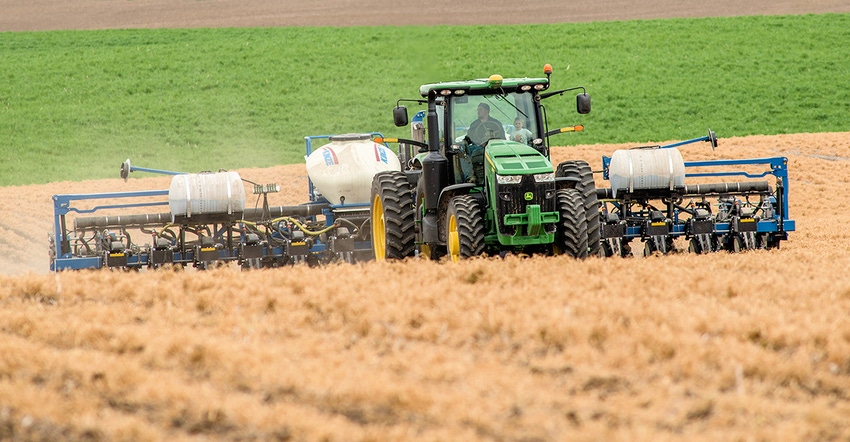
There’s good reason why more and more Pennsylvania soybeans are planted earlier and earlier — higher yields. See 9 tips help you boost bean bushels.
That potential has also been documented by a two-year DuPont Pioneer study that found soybean yields were generally higher with a late April to early May planting date as compared to later planting dates. Reasons: Timing of soybean development stages and day length. Soybeans obtain higher yields when their critical developmental stages occur during longer summer days. Full-season adapted varieties had a greater average yield when planted early. Early-maturing varieties didn’t.
Of course, weather sometimes prevents early planting. In that case, consider these management practices to maximize yield:
• Refrain from switching to an earlier maturity variety unless planting is severely delayed (later than June 15).
• Increasing planting rate by 10% might be beneficial after the first week of June.
• Planting in narrower rows may hasten canopy closure.
Source: DuPont Pioneer
Weigh 4 bin-run bean ‘bummers’
Planting farm-saved or bin-run soybean seeds can harbor hidden costs and risks that quickly “eat” possible savings, caution Alyssa Collins and Paul Esker, plant pathologists at Penn State University. While commercial seed bean costs can range from 7% to 25% of total production costs, here are four factors that can punch a hole in saved-seed savings:
• When you purchase commercial seed, you often must sign a license agreement stating you will not save seed from that crop for the next season. Not complying with that agreement can have legal consequences — many farmers have been caught and sued.
• You still need to know the seed germination percentage to calculate seeding rate and plant stands. Seed testing labs do it, for a small fee.
• Saved seed should also be cleaned before storage, certainly before planting. Appropriate cleaning equipment must be used to separate small or unhealthy seeds, rocks, plant debris, and weed seeds. The latter is certain to add to your costs down the road by spreading weed seeds to new fields.
• Failure to follow appropriate drying and storage moisture levels put seed embryos at risk of fungal and bacterial growth. Healthy-looking seed lots can still be contaminated with pathogens that spring to life in the field.
All these factors can directly and negatively impact on your input costs. Commercial seed treatments won’t improve saved-seed quality. They only protect seed from certain pathogens and insects, and applying them usually requires special equipment — at an additional cost.
Source: Penn State Extension
Triple grain yields? Maybe
A simple genetic modification may triple sorghum grain yields. USDA Agricultural Research Service scientists working through the Cold Spring Harbor Laboratory in New York have discovered that lowering a key hormone — jasmonic acid — generates more flowers and seeds in sorghum. The discovery opens an opportunity to significantly increase yields of rice, corn and wheat.
Doreen Ware, a CSHL adjunct associate professor and ARS research scientist, led the research, together with ARS colleague Zhanguo Xin. A previously unknown genetic mutation introduced by chemical mutagenesis lowered the plant hormone level, which resulted in a substantial increase in sorghum grains. Each panicle produces hundreds of spikelets and flowers, but normally only part of them produce seeds.
In the modified plants, all spikelets produced seeds, tripling grain numbers. This finding will help guide crop improvement through traditional breeding practices as well as approaches using genome editing technologies, Ware says.
Source: Cold Spring Harbor Laboratory
Organic microbial seed corn treatment
Farmers growing corn for organic feed markets may have a new tool. Indigo is Indigo Ag’s first microbial seed corn treatment certified by the Organic Materials Review Institute.
David Perry, Indigo ag president and CEO, explains it’s an all-natural bio-chemical derived from plant extracts and a proprietary blend of naturally occurring bacteria and fungi. It improves soils health by stimulating microbial activity, accelerating organic matter breakdown and reducing crop stress.
Source: Indigo Ag
About the Author(s)
You May Also Like




